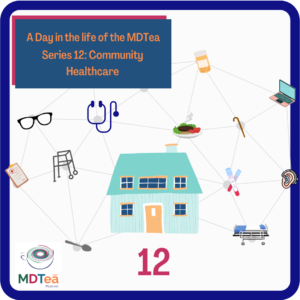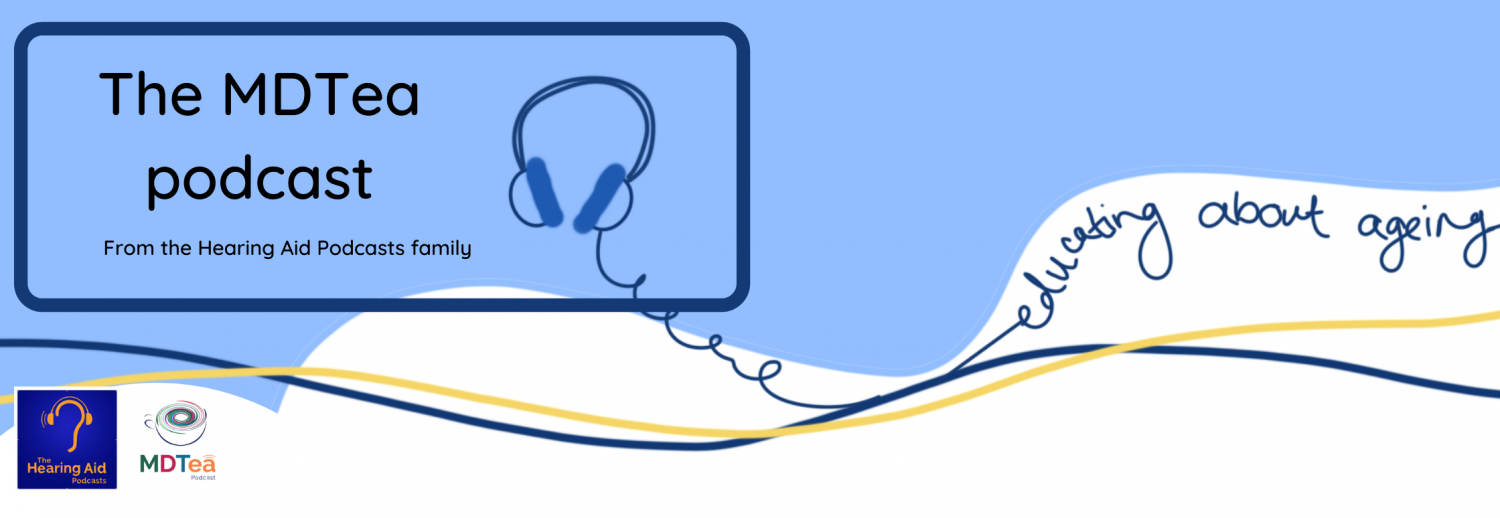Series 12 Episode 2: A Day in the life of Carers and Care Workers

Presented by: Iain Wilkinson, Jo Preston & Georgie Gill
Broadcast Date: 9th August 2022
Recording Date: 27 July 2022
Learning Outcomes:
Knowledge:
- To understand the differences between a carer and a care worker
- To understand the activities a carer or care worker might undertake for a person and the differences between the two.
Skills:
- To have an awareness of the range of support services available to people who may provide unpaid care to a person.
Attitudes:
- To understand how we can empower an older person to be at the centre of their own care decisions.
#MDTeaser
This weeks social media clue word was SUPPORT
Carers and care workers support those they work for to live well.

Paper of the Week
Views of advance care planning in caregivers of older hospitalised patients following an emergency admission: A qualitative study. Bielinska et al, 2022. Journal of Health Psychology. 27(2) 432–444
Main episode notes
There are different people who might support an older person with tasks ranging from managing finances and housework and shopping to assisting with personal care and mobility.
Its important to know that there is a difference between a Carer and a Care worker.
The Health and Social Care Bill (2021) defines a carer as:
(b) a “carer” means any person, including any child under the age of 18, who provides or intends to provide care in respect of a patient to whom the NHS may provide services, but a person is not to be regarded as a carer if they provide or intend to provide care under or by virtue of a contract, or as voluntary work.
However a person might also be supported by a person employed to care for them- a care worker. In this episode we have discussed both groups.
We spoke with Jennifer Twist from Care for the Carers, East Sussex’s carers support service.
1 in 8 people in the UK are a carer, over 6 million people (Carers UK, 2022).
Carers can do a range of tasks and activities for a person, including managing finances, housework, making food, taking someone to appointments and personal care. A person provides support that without, a person would not manage.
Many people may not self identify as carers, they may not see the support they provide as a role of a carer- possibly perceiving carers to be paid, or providing personal care. For this reason it is important to discuss with people who support a person about carers support services and enable them to access advice if required.
People at the Heart of Care: Adult social care reform 2021 White paper acknowledges that carers should be seen as partners in care. In our conversations Jennifer discussed how carers have highly useful skills and knowledge of the person they care for and this should be acknowledged and encouraged by health care professionals.
People at the Heart of care White Paper
Whilst GP surgerys may keep a record of the people they care for who are carers, a person does not have to use a GP to access Carers Support services. Any health professional can refer a person to carers support, and a person can also access services independently. There is no central register for carers.
The Carers Trust website has a useful search function to enable people to find local services and local authority
Carers support services may provide
- – Advice about navigating health systems
- – Advice about finances
- – Carers Support Groups
- – Counselling
- – Carers Cards
Care workers
‘Domiciliary care is the range of services put in place to support an individual in their own home, and is available to those that require additional support with day to day household tasks, personal care or any other activity that allows them to maintain their quality of life and independent living.’ (Helping Hands UK)
There are a number of different Models of domiciliary care delivery, support person to select whats appropriate for them.
- – Visits per day eg ODS/BDS/TDS/QDS
- – Home instead model (longer care calls)
- – Live in care
- – Residential settings such as care homes or nursing homes.
We spoke to Greg Brown who is franchise owner of Home Instead a domiciliary care agency in Surrey, UK.
NICE Guideline 21 gives guidance about what home care services should provide. It highlights the importance on continuity of care, ideally the carers who work with the person should be the same people to enable to relationship to develop for the service user and carers.
Theres also similarities between the work of care workers and reablement services in that we want to support people to continue to achieve their goals rather than doing things for them.
Nice guideance aslo advices services build on opportunities to integrate between social care services and primary care to support holistic health for the service user.
Jean's Journey
Jean might have a daily package of care that was put in place during her time in the D2A care home our social workers arranged after her hospital admission. They might some in 1-4 times a day to assist her with tasks like washing and dressing, cooking, cleaning or doing laundry.
Ideally these Carers remain the same for Jean to help her get to know them and them to know her and create a good relationship of care Like Greg spoke about.
Its also good to remember Jeans family might support her more now, and qualify for carers benefits and support. If we meet them we might be able to talk about supporting their needs too and make them aware of carers support services locally.

We loved hearing from Greg and Jennifer so much that we’ve released the full interviews with them to listen to as a bonus for you! Have a listen here!
Curriculum Mapping
NHS Key Skills Framework | Core Health and Wellbeing | Communication 2: Personal and People development: Quality HWB4 Level 2 HWB4 Level 3 | Communicate with a range of people on a range of matters Contribute to own personal development Maintain the quality of own work Enable people to meet ongoing health and wellbeing needs. Plan , deliver and evaluate care to meet peoples health and wellbeing needs |
Foundation training Curriculum | Foundation Year 1 | Section 2.6 Interface with HCPs Section 2.7 Interaction with Collegues Section 4:20 Healthcare resource management | Describes the structure and importance of the wider healthcare team Works effectively within the healthcare team for the benefit of patient care Makes clear, concise and timely written and oral referrals to other healthcare professionals within the hospital Acts as a member of the multidisciplinary professional team by supporting, respecting and being receptive to the views of other healthcare professionals Works effectively with others towards a common goal e.g. accepts instructions and allocation of tasks from seniors at handovers and multidisciplinary team meetings Demonstrates understanding of the organisational structure of the NHS and independent sector and their role in the wider health and social care landscape Describes hospital and departmental management structure |
Foundation Year 2 | Section 2.6 Interface with other healthcare professionals Section 2.7 Interaction with Colleagues | Demonstrates ability to make referrals across boundaries / through networks of care (primary, secondary, tertiary) Demonstrates initiative e.g. by recognising work pressures on others, providing support and organising / allocating work to optimise effectiveness within the clinical team | |
Section 2.7: continuity of care/ Interaction with colleagues | |||
GP training Curriculum | Clinical management Managing complex and long term care Working with colleagues and in teams Working well in organisations and systems of care
Community orientation | Contribute to an organisational and professional approach that facilitates continuity of care (e.g. through adequate record keeping and building long term patient relationships) Organise follow up of your patients after referral through multiprofessional, team bases and structured approaches including monitoring, reviewing and regular care planning. Demonstrate the ability to effectively ‘navigate’ patients with multiple problems along and between care pathways, enabling them to access appropriate team members and services in a timely and cost-effective manner. Enhance working relationships by demonstrating understanding, giving effective feedback and maintaining trust. Appropriately seek advice from other professionals and team members according to their roles and expertise. Show commitment to a process of continuing professional development through critical reflection and addressing of learning needs. Recognise the importance of distributed leadership within health organisations, which places responsibility on every team member and values the contribution of the whole team Describe the current structure of your local healthcare system, including various role, responsibilities and organisations within it, applying this understanding to improve the quality and safety of care you provide. | |
Core medical training curriculum | Managing long term conditions and promoting patient self care: | Define the role of rehabilitation services and the multi-disciplinary team to facilitate long-term care Recognise importance of multi-disciplinary assessment Contribute to effective multi-disciplinary discharge planning | |
Internal medicine training curriculum (Stage 1) | Cat 2.3 . Communicates effectively and is able to share decision making, while maintaining appropriate situational awareness, professional behaviour and professional judgement | Communicates effectively with clinical and other professional colleagues Applies management and team working skills appropriately, including influencing, negotiating, re- assessing priorities and effectively managing complex, dynamic situations | |
Geriatrics and higher specialty training curriculum | 30: Rehabilitation and Multidisciplinary team working 31: Planning transfers of Care including discharge | Define the role of rehabilitation services and the multi-disciplinary team to facilitate long-term care Roles and expertise of different members of interdisciplinary team Physical therapies which improve muscle strength and function Therapeutic techniques/training to improve balance and gait Aids and appliances which reduce disability. Understand the structure, roles and responsibilities of the multi-disciplinary team including the importance of outside agencies, and the way in which individual behaviours can impact on a group Role of the geriatrician and the multidisciplinary team in discharge planning
|

